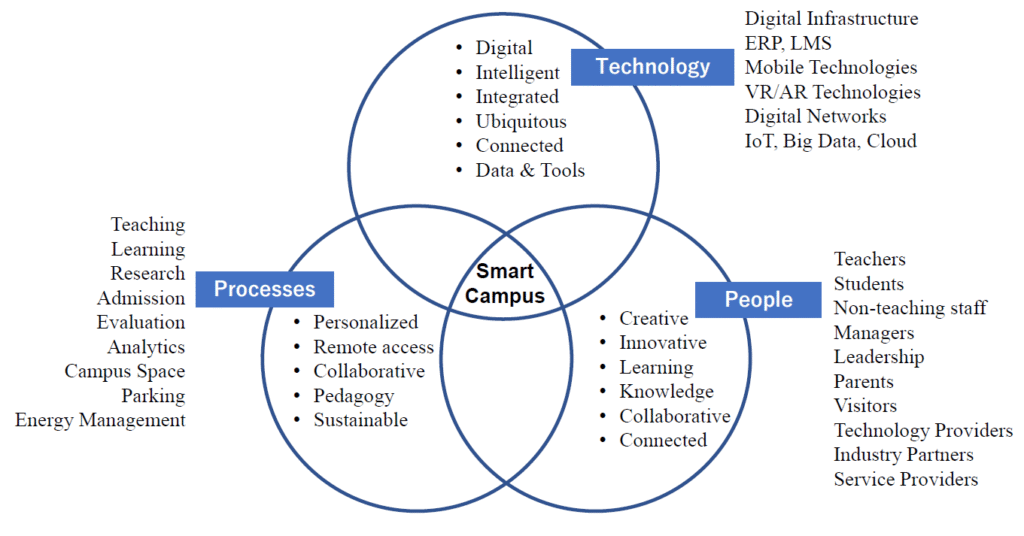Digital:

GIIM will work with you to derive the appropriate focus & content for the courses within this certificate, based on the specific type of education institution/organization (e.g., K-12 Educational Institutions, Higher Education Institutions, Educational Publishing Companies, EdTech Companies, Tutoring and Test Prep Companies, Professional Development and Training Companies, Language Learning Companies, Educational Toy and Game Companies, Educational Consultants and Advisory Services), and the backgrounds and objectives of the candidates.

Course goals and content are designed to enable organizations (e.g., managers, teachers) to define strategies and plans to deploy education/training initiatives (e.g., technical training, management and skills development) and associated administration processes through the effective utilization of various delivery models and approaches; especially online, leveraging emerging digital technologies like AI. The course focuses on the process for analyzing the objectives of the training/education programs, and defining specific organizational strategies, while designing effective plans for current/emerging technology utilization, including synchronous and asynchronous education/training initiatives, and adaptive learning.
Topics & concepts:
This course focuses on preparing for the differences in language, culture, and perspectives when defining international and interorganizational (e.g., business/management versus IT/technical) education/training programs.
Course topics & concepts:
This course provides processes for the development and facilitation of project/process-based learning experiences, to enhance training/education effectiveness. The teaching and learning of high-level thinking processes including problem solving, creative thinking, communications, collaboration, teamwork, and constructive critical thinking is perhaps one of the most difficult levels of competency to achieve in any organization. This course helps managers and teachers design and implement customized case studies to train/educate employees/students/candidates. The case studies provide environments for the development and evaluation of these process skills, utilizing the company’s content.
Course topics & concepts:
This course provides methods and project-oriented experiences, enabling managers and master trainers to educate their sub-groups in facilitation methods for managing transition and change within the organizational structure. Most often, it’s not the change itself that defeats a new technology implementation, nor new methods, skill sets or the flexibility required to change the workforce’s thinking – it’s the transition from losing a known skill set, to the new company mission/goals, which have not been acquired or mastered. This program helps companies with training organizations to develop the capacity for change, helping employees and administrators to acquire new skills critical for their company’s success.
Course topics & concepts:


As education organizations accelerate the digital transformation of their industry, they are focusing their investments in leveraging information technology to improve student outcomes, improve the quality of programs and research, and lower overall costs. In today’s highly regulated, increasingly resource-constrained, and cost-focused environment it is essential to understand how to manage an organization’s information technology (IT) resources effectively and efficiently. There are numerous strategic, tactical, and operational choices to be made about managing Education IT resources and it is essential to ensure that IT and non-IT executives across the organization work in harmony.
Experience has made it clear that education organizations need well-conceived organizational structures, skills, processes, and decision rights to ensure that IT investments are appropriately leveraged across the organization, especially when considering the impact of emerging information technologies.
This course prepares education executives/professionals by providing a comprehensive understanding of the fundamental decisions related to the management of IT resources in the education environment. The course will also provide an overview of current and future relevant education information technologies and their potential impact on students, faculty, administrative organizations, and associated stakeholders. The focus will be on leveraging AI and the successful deployment of AI initiatives in education.
The course is designed to be delivered live/synchronously (face-to-face or online) with a total of twenty (20) contact hours. While the schedule is flexible, it is usually delivered in approximately eight (8) 2.5-hour modules/lectures/sessions.
The IT-Education topics/sessions include:
A. Sessions 1-2; COURSE INTRODUCTION & IT-BUSINESS MANAGEMENT
Deriving IT-business strategies
Enhancing business-IT alignment
The business value of IT
Governance (i.e., decision-making and decision rights)
Considerations for types of organizational structure & sourcing
Managing emerging technologies
Sessions/topics addressing the specific definition, concepts, and contexts of Education IT & leverage emerging digital/AI technologies in academic processes:
B. Sessions 3-4; ACADEMIC & LEARNING SUPPORT
Adaptive Learning
Special needs students access a more equitable education
Deploying a Universal Design for Learning (UDL) framework to help educators create inclusive learning environments by addressing the diverse needs of all students.
Early Childhood Education
Writing: helping students improve their writing skills
Lesson Planning
Language Learning
Test Prep
C. Sessions 5-6; SCHOOL MANAGEMENT
Classroom/Behavior Management
Classroom Audio-Visual
Student- Parent-Teacher Communication
Student, Faculty, & Staff Assessment
Learning Management Systems
Gamification for Enhanced Student Engagement
Staff Scheduling and Substitute Management
Professional Development
Transportation
Building and Equipment Maintenance and management (e.g., power, Wi-Fi and water services)
Finance & Budget Management
Cybersecurity
Safety and Security
Records Management
Scheduling
Alumni Management
D. SESSIONS 7-8 HIGHER EDUCATION
Plagiarism Detection
Exam Integrity
Chatbots for Enrollment and Retention
Learning Management Systems vs Learning Experience Platforms and emerging technologies
Transcription of Faculty Lectures
Enhanced Online Discussion Boards
Analyzing Student Success Metrics
Academic Research
Connected Campuses

Global Institute for IT Management © 2025